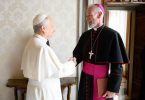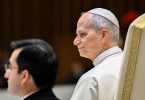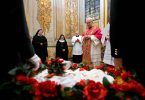
by Justin McLellan
VATICAN CITY (CNS) — In the mold of Sts. Peter and Paul, Catholics are called to be members of a church that constantly follows Jesus and proclaims his word by putting preaching at the center of its ministry, Pope Francis said.
Dressed in red vestments to recall the apostles’ martyrdom, during his homily at a Mass for the feasts of Sts. Peter and Paul in St. Peter’s Basilica June 29, Pope Francis reflected on how Rome’s patron saints responded to “the most essential and most important question of all: Who is Jesus for me? Who is Jesus in my life?”
St. Peter’s answer, he said, “can be summed up in one word: follow.” When Jesus called out to St. Peter, he did not respond “with a faultless doctrinal formula or a set of preconceived notions,” the pope said, but “left his nets and followed Jesus, without demanding any kind of guarantee beforehand.”
The apostle’s response “invites us to be a church that follows. A church that strives to be a disciple of the Lord, a lowly servant of the Gospel,” he said. “Only in this way will the church be capable of dialoguing with everyone and becoming a place of accompaniment, closeness and hope for the men and women of our time.”
For St. Paul, on the other hand, encountering Jesus means to “proclaim, to preach the Gospel.”
“The apostle teaches us that we grow in faith and in knowledge of the mystery of Christ when we preach and bear witness to him before others,” said Pope Francis. “This is always the case: whenever we evangelize, we are ourselves evangelized.”
Celebrating Mass with metropolitan archbishops appointed in the last year, the pope said that St. Paul’s spirit of evangelization is “necessary also for the church in our day: to put preaching at the center.”
He asked Catholics to form a church that is “outgoing, finding joy not in the things of the world, but in preaching the Gospel before the world and opening people’s hearts to the presence of God.”
That mission is achieved, the pope said, by bringing Jesus everywhere: in families, relationships, neighborhoods, civil society, the church, political life and, especially, “in those places where poverty, decay and marginalization are deeply rooted.”
Concelebrating the Mass with Pope Francis were 29 new metropolitan archbishops from 18 countries.
During the introductory rites the pope blessed the palliums after they were brought up from the crypt above the tomb of St. Peter. The palliums, woolen bands that the heads of archdioceses wear around their shoulders over their Mass vestments, symbolize an archbishop’s unity with the pope and his authority and responsibility to care for the flock the pope entrusted to him.
Among those receiving their palliums were U.S. Archbishop George L. Thomas of Las Vegas, Canadian Archbishop Frank Leo of Toronto, Spanish Archbishop José Cobo Cano of Madrid and Argentine Archbishop Jorge García Cuerva of Buenos Aires.
Cardinal Baltazar Porras Cardozo received a pallium for the second time. He had previously received one from St. John Paul II as archbishop of Mérida, Venezuela, in 1992, and received a new one from Pope Francis June 29 as archbishop of Caracas.
The pope blessed the palliums during the Mass and handed them, in a box, to each archbishop after the liturgy. The nuncios in their home countries will formally impose the pallium on each archbishop in his archdiocese in the presence of his faithful and bishops from neighboring dioceses.
Also present in the basilica was Orthodox Metropolitan Job of Pisidia, representing the Ecumenical Patriarchate of Constantinople, who embraced Pope Francis during the exchange of peace. After Mass the two prayed together in silence at the entrance to the chapel in front of St. Peter’s tomb and before a statue of St. Peter decoratively dressed in vestments and wearing a papal tiara, as is customary on the saint’s feast day.
Pope Francis presided over Mass but remained seated as he delivered the homily. Cardinal Giovanni Battista Re, dean of the College of Cardinals, was the main celebrant at the altar.
The pope addressed the new metropolitan archbishops during his homily and asked them to imitate Sts. Peter and Paul.
“Be disciples in following and apostles in preaching,” he said. “Bring the beauty of the Gospel everywhere, together with all the people of God.”
Pope Francis warned them against coming up with excuses for not being like St. Peter who immediately followed Jesus, noting how some excuses “are disguised as spiritual,” such as saying, “I am not worthy.”
“This is one of the devil’s ploys,” the pope said, “it robs us of trust in God’s grace by making us think that everything depends on our own abilities.”
Constantly following Jesus does not result in “a privatized piety that leaves us peaceful and unconcerned about bringing the Gospel to others,” Pope Francis said, but leads to a church “that cannot live without sharing with others the embrace of God’s love and the joy of the Gospel.”
He asked Catholics to play their part in building that church: a church “that needs to preach just as we need oxygen to breathe.”






